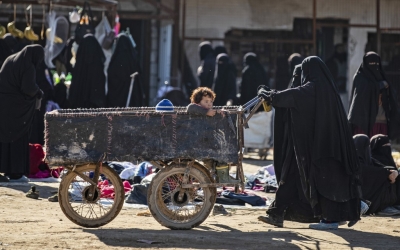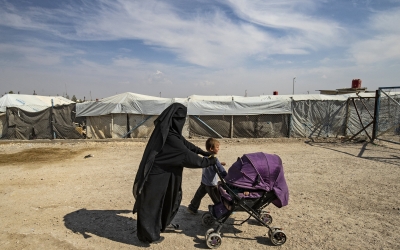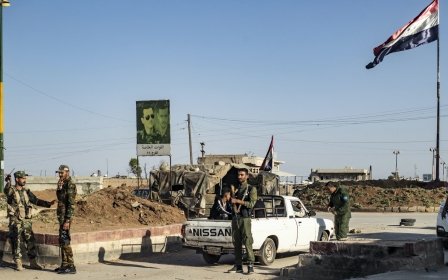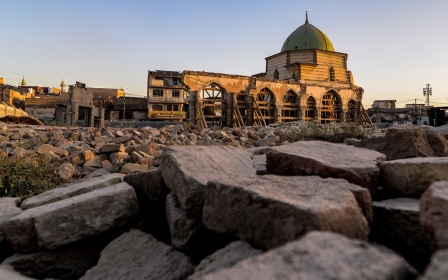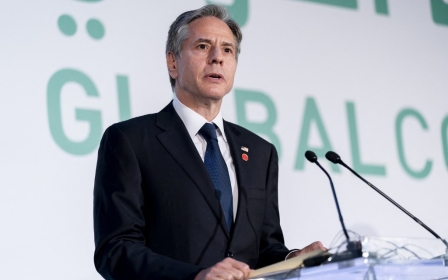UK MPs launch investigation into Britons trafficked by Islamic State group
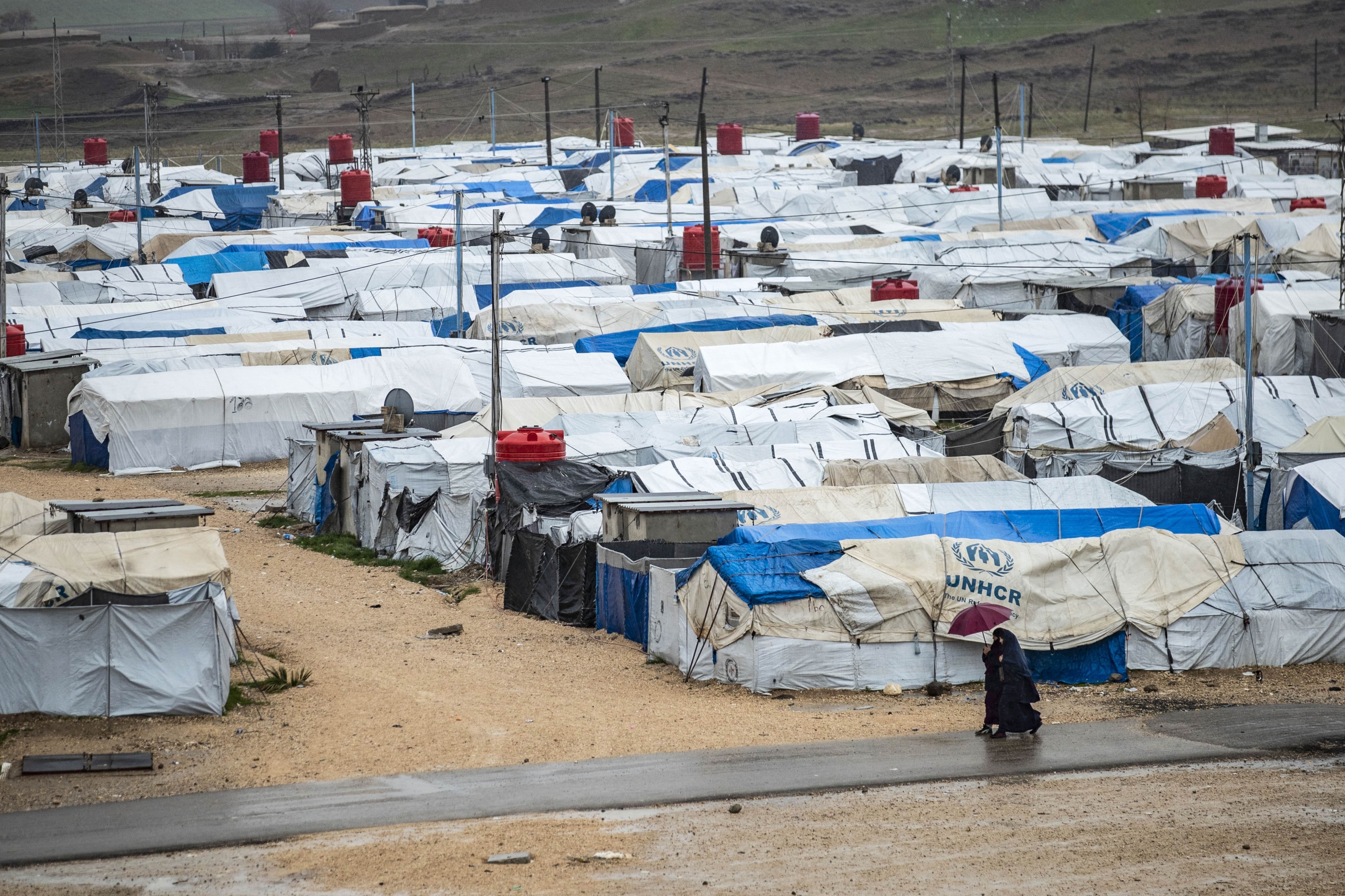
A British parliamentary group launched an inquiry on Tuesday into the trafficking of British nationals by the Islamic State (IS) group, hearing testimony from experts who criticised "ad-hoc" policing and urged the UK government to "look at terrorism cases… through the trafficking lens".
The All Party Parliamentary Group on Trafficked Britons in Syria is seeking the repatriation of trafficking survivors currently held in Kurdish-run camps across northern Syria for family members of suspected IS militants.
Reprieve, a human rights group based in London, estimates that 25 British adults and 34 British children, including a 12-year-old girl, continue to be indefinitely held in the camps, which UK courts have said equates to "cruel, inhuman and degrading treatment".
The cross-party parliamentary group - which is chaired by Conservative MP Andrew Mitchell, Labour MP Lyn Brown, and Lord Jay of Ewelme, a crossbench peer and former head of the diplomatic service - is also seeking to "learn lessons from public authorities’ failure to identify and protect victims of Daesh trafficking". Daesh is an alternate name in Arabic for the militant group.
Lord Jay of Ewelme said in April, ahead of an evidence session on the day of the group's launch: "We must not abandon British trafficking victims to die in the desert or disappear into Bashar al-Assad's torture prisons.
"The Government is fully capable of bringing these families home and resolving their cases in the UK."
Experts told the session on Tuesday that many of the people who joined IS were coerced, tricked or emotionally manipulated into leaving their homes, and implored the UK government to be aware that many of the people who left the UK for Syria and Iraq may have been trafficked.
"Introducing anti-trafficking expertise into fact-finding of terrorism is absolutely crucial," said Jayne Huckerby, an clinical professor of law at Duke University and inaugural director of the Duke International Human Rights Clinic, giving an example of how a trafficking expert and a violent extremism expert would view the destruction of travel documents.
While the trafficking expert would see it as an indication that someone might not be able to leave a particular group, said Huckerby, a "terrorism expert" might view it as a measure of their commitment.
"The siloing of anti-trafficking expertise is really consequential."
The trafficking lens
In a report published in April, Reprieve said that two-thirds of British women detained in Syria met the legal definition of trafficking victims, as they were subject to sexual and other forms of exploitation, with the vast majority under the age of 18.
Based on three years of investigations and multiple visits to the Kurdish-run camps, the report revealed that many British women left in northeast Syria were coerced into travelling there, moved within Syria against their will or were taken to IS territory as children.
Experts believe IS employed tactics similar to those used by child sex trafficking gangs, and "systematically" recruited hundreds of women and girls "who were forced into marriage, sexual slavery, domestic servitude and other forms of exploitation".
'If you lined up 10 law enforcement officers in a room and presented them with a table with a bag of coke, a bag of cannabis, an AK-47, a forged cheque and a victim of trafficking, they would all identify four out of five.'
- Steve Harvey, trafficking expert
Maya Foa, joint executive director of Reprieve, said at the time that many of the British women detained in Syria were "groomed by a sophisticated IS trafficking operation".
"Rather than recognise them as trafficking victims, the [UK] government has in most cases stripped them of citizenship and abandoned them," said Foa. "It should repatriate all British nationals in the camps and bring prosecutions in British courts where there is a case to answer."
Nadia, a British teenager stranded in Syria, told Reprieve that she was 12 when her male relative from the UK took her to IS territory.
As a young teenager, she was repeatedly raped, forced into marriage at the age of 14, and had her first child - conceived in rape - when she turned 15.
Huckerby cited the example of Shamima Begum in Tuesday's parliamentary session. "She was recruited by an online female ISIS recruiter before she went to Iraq, in 2015, at the age of 15. On arrival she was put in a house for women, and married to a Dutch fighter within 10 days - a child bride," she said.
"She was pregnant the next year with a daughter who later died. Two other children would also pass away," Huckerby added, "legally, this is not a difficult case."
Begum was recruited, transported and exploited, she said: "That means she was trafficked."
Instead of being treated as a victim of trafficking, the UK government has stripped Begum of her citizenship and denied her the right to return home, violating what is known as the "non-punishment principle", the idea that if a person who is trafficked subsequently commits a related crime, they should not be punished.
Children cannot legally give consent to be trafficked, but governments justifying decisions to not repatriate their citizens often overlook this and treat them as adults who voluntarily joined ISIS.
"We are really calling [on state's] to look at terrorism cases… through the trafficking lens," said Tarana Baghirova, from the Office for Security and Co-operation in Europe (OSCE).
"The starting point for prevention is identifying those people," she added, "seeing them as victims."
'Ad-hoc' approach
The major problem with this approach, according to Steve Harvey, who as a police officer was part of the UK's first trafficking investigations, is that British police have no standardised protocols for identifying and dealing with people they suspect have been trafficked.
"If you lined up 10 law enforcement officers in a room and presented them with a table with a bag of coke, a bag of cannabis, an AK-47, a forged cheque and a victim of trafficking, they would all identify four out of five," he said.
Some countries have what is known as a Standard Operation Procedure, said Harvey, "an idiots guide" for law enforcement to deal with human trafficking cases. The UK does not, despite being home to a rising number of human trafficking and modern slavery cases in recent years.
A key place to identify possible IS trafficking cases is at airports.
"If you're with Special Branch working at Heathrow Airport on the departure gate for Istanbul, or Ankara, and you meet three girls travelling to Turkey, that should be alarm bells all over the place," said Harvey.
All it takes is a "45 to 60-second conversation" with the first member of the authorities who recognises a potential trafficking case, he added.
"Has the definition of trafficking been met? Should I make some further inquiries? Do we need to do something? No, have a good journey."
Trafficking victims are diverse and there are no definitive indicators, he added, as cases are context-specific. But the procedures in place in the UK at present are "totally ad-hoc", said Harvey, and in his experience, police interviews "are shockingly poor” at identifying victims.
"It's the state's responsibility… to identify victims of trafficking," he said. "It's about delivering training."
"Trafficking is a complex multi-layered crime. I'm sorry to say, even after two-plus decades of other law enforcement being aware of what human trafficking is, [British police] are still not delivering a common response."
A government spokesperson told Middle East Eye: “We make no apology for doing whatever is necessary to keep the UK safe from those who pose a threat. Those who remain in the conflict zone include incredibly dangerous individuals, many choosing to stay to fight or otherwise support Daesh.”
Legal obligation to repatriate
During Tuesday's session, UN Special Rapporteur on Human Trafficking, Siobhan Mullally, reminded the Parliamentary group of the British government's legal obligation to safeguard and repatriate people who are trafficked out of the country.
The main legal instruments are the Council of Europe Convention on Action against Trafficking and the UN Trafficking in Persons Protocol (ratified by the UK in 2006), she said, both of which have been relied upon multiple times in UK courts, including the Supreme Court.
As yet, however, despite their legal obligations and the "inhuman" and “degrading” conditions at the camps, the UK has declined to repatriate the remaining Britons detained in northeastern Syria, some 15 families.
Since the conflict in Syria began, more than 900 people have travelled from the UK to Syria and Iraq. Roughly a quarter were killed in the conflict while just under half have since returned to the UK.
Middle East Eye propose une couverture et une analyse indépendantes et incomparables du Moyen-Orient, de l’Afrique du Nord et d’autres régions du monde. Pour en savoir plus sur la reprise de ce contenu et les frais qui s’appliquent, veuillez remplir ce formulaire [en anglais]. Pour en savoir plus sur MEE, cliquez ici [en anglais].



